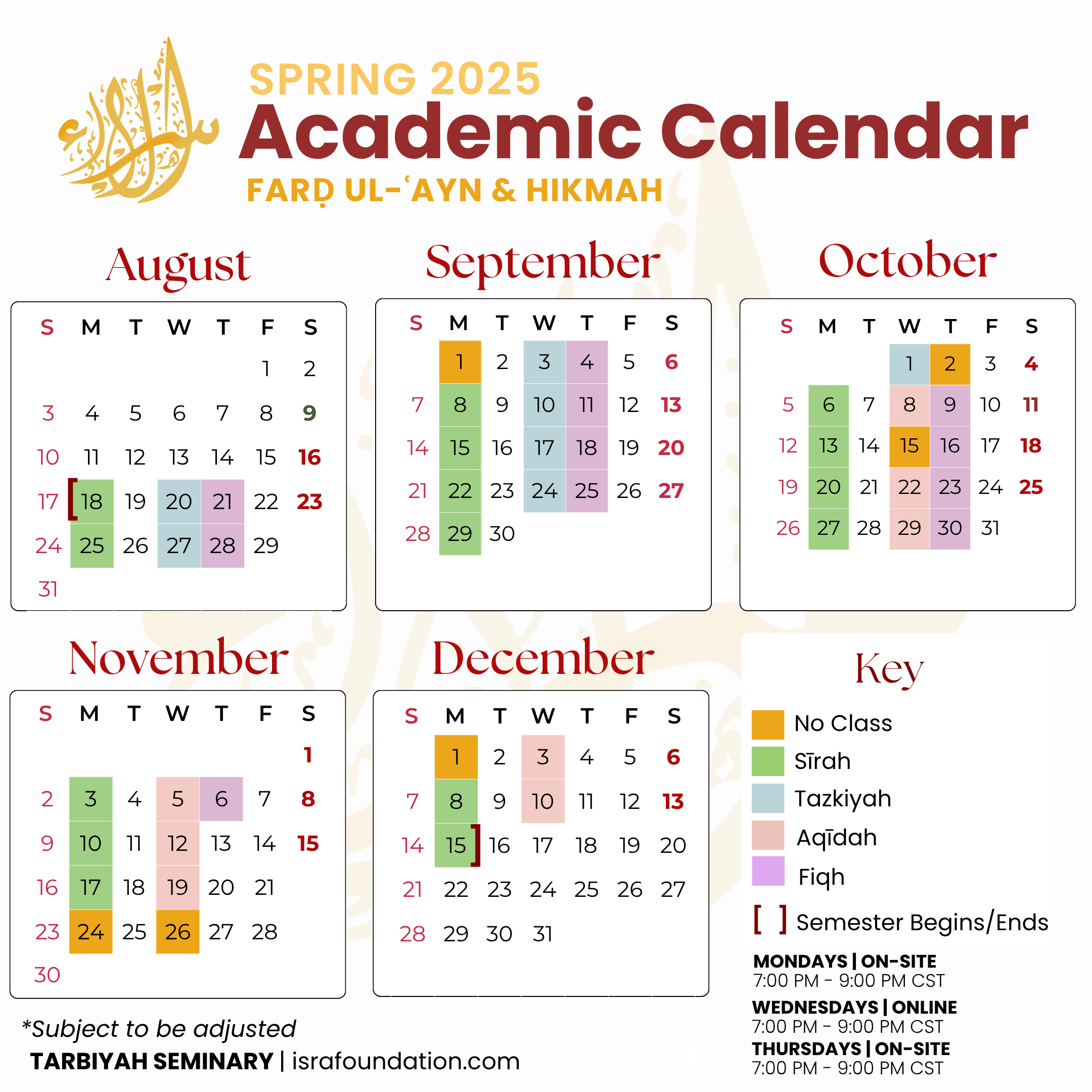
Farḍ ul-ʿAyn
5-Month Islamic Studies Program
August 18th, 2025 - February 12th, 2026
Our beloved Prophet ﷺ said:
“Seeking knowledge is farḍ upon every believer.”
Fulfill this obligation by committing to a structured journey in Islamic learning. The Farḍ ul-ʿAyn program offers a balanced, in-depth curriculum across 5 months, carefully designed to build a firm foundation in the essentials of Islam.
This hybrid certification program accommodates both college students and working professionals through flexible online and in-person class options.

A well-rounded curriculum designed to enhance your Islamic knowledge.
Comprehensive
Curriculum
Affordable
Tuition
Classes are affordable to ensure that no student ever feels that finances should be a hindrance to their education.
Hybrid
Learning
Combination of online and in-person classes, ideal for college students and working professionals.
Convenient
Schedule
Sessions tailored to fit into busy schedules, providing flexibility without compromising on learning.

Schedule
August 18th, 2025 -
February 12th, 2026
Mon, Wed, & Thu
7:00 PM - 9:00 PM CST

Option 1:
One-Time
$1000/Year
Option 2:
Individual
Course
$175/course
*Financial Aid available.
Step 1:
Apply
Submit an application
Step 2:
Interview
Get an interview
from our team
Step 3:
Payment
Complete registration
by submitting payment

Course Catalog
-
Text: Ascent to Felicity by Imām Abū al-Ikhlāṣ al-Shurunbulālī
Course Description: This course covers the essential aspects of Fiqh related to purity (ṭahārah) and prayer (ṣalāh), based on Ascent to Felicity by Imām Abū al-Ikhlāṣ al-Shurunbulālī. Students will learn the detailed rulings and correct methods for performing daily acts of worship, with a focus on both physical and spiritual preparation. The course will also explore essential topics and contemporary rulings, equipping students to navigate modern-day scenarios with confidence. We will examine the various opinions of the four major schools of thought, along with lesser-known scholars, fostering a deeper and more well-rounded understanding of Islamic practice.
-
Text: 'Aqīdah at-Tahāwī by Abū Jaʿfar Aḥmad aṭ-Ṭaḥāwī
Course Description: In this immersive course, we delve deep into 'Aqīdah at-Tahāwī, a pivotal text on Islamic creed. Gain a comprehensive understanding of the core beliefs of Islam as outlined by Imam Tahawi, while also tracing the historical evolution of Aqīdah. Uncover the unity of Allāh, the concept of prophethood, the mysteries of life after death, and the historical contexts that have shaped these beliefs. This transformative voyage through 'Aqīdah at-Tahāwī' and the history of Aqīdah will establish a strong foundation for nurturing a resilient Islamic identity.
-
Course Description: Focused on spiritual purification, this course emphasizes personal development and ethical conduct. Students will explore classical texts on the etiquettes of a student, cultivating virtues essential for a successful and fulfilling learning journey. The curriculum delves into the importance of sincerity, humility, patience, and respect in the pursuit of knowledge. Through guided reflections and practical applications, students will learn to embody the principles of proper behavior, enhancing their academic and spiritual growth. The course also includes discussions on the impact of good character on one's personal and communal life, aiming to nurture well-rounded individuals who contribute positively to society.
-
Course Description: This foundational course offers a comprehensive introduction to the sciences of Ḥadīth, exploring the history, development, and methodology used in the authentication and study of Prophetic traditions. Students will learn about the significance of Ḥadīth in Islamic jurisprudence, the classification of Ḥadīth, and the principles of transmission and collection. The course will cover key topics such as the biographies of major Ḥadīth collectors, the chain of narrators (isnād), and the text (matn) of Ḥadīth. By the end of the course, students will have a solid understanding of the essential concepts and tools used in Ḥadīth sciences, preparing them for more advanced studies.
-
Text: Ṣaḥīḥ al-Bukhārī, Ṣaḥīḥ Muslim, Sunan Abū Dāwūd, Sunan al-Tirmidhī, Sunan al-Nasāʾī, Sunan Ibn Mājah, Muwaṭṭaʾ Imām Mālik, Musnad Aḥmad, and Muṣannaf ʿAbd al-Razzāq
Course Description: This course will explore the monumental efforts of the Preservers of the Prophetic Legacy. Covering the Ṣiḥāḥ Sittah, Muwaṭṭaʾ Imām Mālik, Musnad Aḥmad, and Muṣannaf ʿAbd al-Razzāq and others, we will delve into the lives of the great Ḥadīth Imāms, their methodologies, and the Ḥadīth unique to their collection. Each week, we will study different major Ḥadīth works and their authors, deepening your understanding of how the Prophetic sayings were preserved for future generations. Upon successful completion, an Ijāzah will be awarded. Conditions apply.
-
Text: Zād at-Tālibīn by Shaykh Mufti Muhammad Ashiq Ilahi Buland Shahri
Course Description: This course involves the study of about 200 Ḥadīth, focusing on both memorization and grammatical analysis. These are short Ḥadīth that encompass libraries of wisdom.
-
Course Description: Students will embark on a study of the Meccan phase Sīrah, gaining a profound understanding of the life and mission of the Prophet Muḥammad ﷺ during the early days of Islam. The curriculum responds critically to orientalist perspectives, nurturing the ability to engage in informed dialogue about the Sīrah. Unlike conventional approaches, this course's academic orientation enriches the understanding of the Prophet's ﷺ life, empowering students to appreciate its timeless relevance in contemporary contexts.
-
Course Description: Students will embark on a study of the Madinah phase of the Sīrah, exploring the strategic, political, and communal developments during the Prophet’s ﷺ leadership in Madinah. The curriculum responds critically to orientalist perspectives, nurturing the ability to engage in informed dialogue about the Sīrah. Unlike conventional approaches, this course's academic orientation enriches the understanding of the Prophet's ﷺ life, empowering students to appreciate its timeless relevance in contemporary contexts.
Frequently Asked Questions
-
Yes, financial aid options are available for eligible students to help students cover the cost of tuition. Click here for more information and how to apply.
-
Yes, students who successfully complete the program will receive a certificate of completion, recognizing their achievements in Islamic Sciences.
-
Course materials and textbooks are specified for each course. You will receive a detailed list of required materials upon enrollment.
-
Yes, all classes are recorded and made available to enrolled students. This ensures that you can catch up on any missed sessions and review the material at your convenience.
-
There are no specific prerequisites for enrolling in the program. However, a basic understanding of Islamic studies is beneficial. Our program is designed to cater to students of varying levels of knowledge and expertise.
-
Regular attendance is strongly encouraged to ensure you gain the most from the program. However, we understand that circumstances may arise, and class recordings are available for you to review at any time.
-
Students have access to a range of support services, including academic advising, tutoring sessions, and technical support for online learning platforms. Our faculty and staff are committed to helping you succeed.


